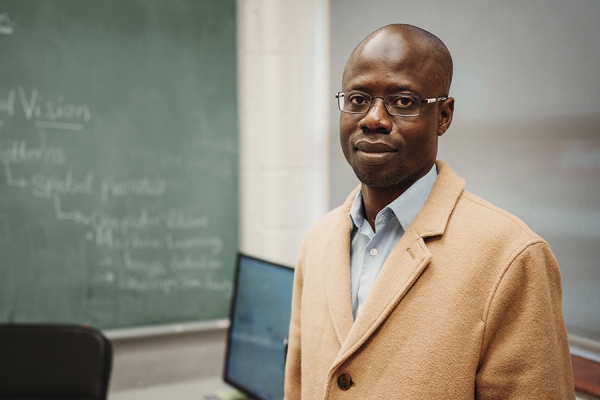 Karim Malik, an assistant professor in the School of the Environment since January, is developing tools to monitor human impact on natural landscapes.
Karim Malik, an assistant professor in the School of the Environment since January, is developing tools to monitor human impact on natural landscapes.
Fresh on campus, Karim Malik already has big plans for his research program.
An assistant professor in the School of the Environment as of January 2024, he is developing tools to monitor land-use and landcover change, and the effects of climate change through investigating patterns of transformation in remotely sensed data.
“Given the burgeoning rate of natural and anthropogenic disturbances, the development of tools for monitoring land-use and landcover change has become more imperative than ever,” Dr. Malik says.
“My research detects and quantifies anthropogenic impacts on the natural environment. For example, if you take a natural landscape that is not developed and then humans come in, clear vegetation and build houses — there will be changes there.
“So how do we detect how much land has been used and how much is left unchanged? I am developing computer vision and geospatial tools to compare patterns in land-use and landcover; with spatially sensitive tools, we can detect and quantify change if we compare attributes in land-use and landcover maps over space and time.”
As he designs his GeospatialVision lab and recruits graduate students, Malik will focus on integrating and developing tools from Geographic Information Science (GIScience) and artificial intelligence (AI) to advance understanding of how human-induced disturbances impact the environment.
“My research investigates the potential of computer vision and machine learning methods to compare patterns inherent in Earth observation measurements such as data acquired through remote sensing technology,” he says.
“We need to extensively explore these emerging tools and begin to discover spatial-temporal changes, get some solutions, and effectively monitor anthropogenic impacts on the Earth’s systems.”
Acting director of the School of the Environment Alice Grgicak-Mannion says it is a thrill to have Malik join the department.
“His expertise in remote sensing and machine learning techniques will bring another heightened level of geospatial prowess into our unique GISc. Certificate program,” says Dr. Grgicak-Mannion.
“Dr. Malik's research will also be a wonderful catalyst in promoting specialized prediction and visualization methods of terrestrial environments and landscape change to our students and colleagues.”
His work will help propel more conversation about land-water-climate interactions and sustainability, says Grgicak-Mannion, which is something that humans are desperate to understand, especially as we continue to experience volatile environmental changes and impacts.
“Most importantly, it is Dr. Malik's belief that geospatial technologies, such as GIS, UAVs, and remote sensing can be shared and taught to anyone, especially to those who have never seen or heard of these technologies,” she says.
“That thinking alone brings another level of nobility not only to our programs and our students but also to EDI initiatives that are blossoming across campus."
Malik was hired through a recruitment effort of the UWindsor Black Studies Institute to hire Black-identifying scholars across campus who will enhance research, creative, and scholarly work, and community collaboration.
“This is a great opportunity for a young generation of Black scholars to contribute meaningful work to academia and the community,” he says.
